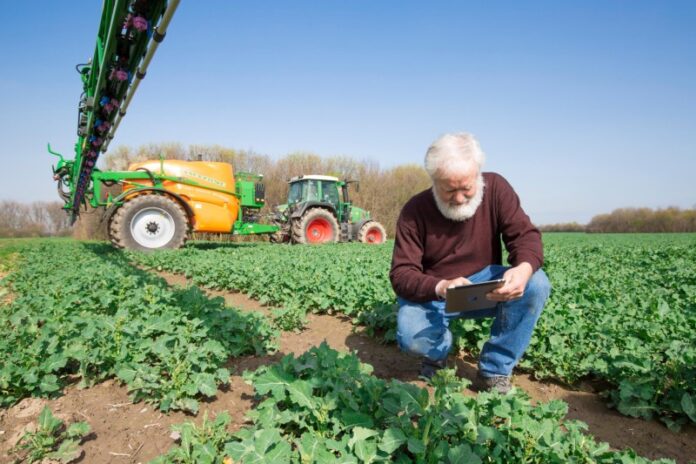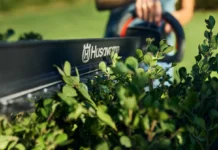Bayer reinforces its commitment to digital farming solutions for the transition to regenerative agriculture at this year’s Agritechnica, an international showcase for the agricultural machine industry. The life science company presents a comprehensive set of innovative solutions leveraging precision farming through data and artificial intelligence at its booth C15 in hall 8 at the trade fair, taking place November 12-18 in Hanover, Germany.
Bayer experts will share insights on how the company’s digital farming solutions – existing and those launching in the near future – will contribute to making agriculture more sustainable. On site, guest speakers will present a variety of topics including Bayer’s products and partnerships. Additionally, Bayer experts will speak on panels throughout the event at the DLG Main Stage and in the Startup Pavilion, including “Challenges and Opportunities of Farming in Eastern Europe,” “Digital & Sustainable Crop Protection,” “Data Interoperability & AI,” and “Bayer ForwardFarming.”
“A regenerative agricultural system that produces more with less while restoring more is only possible with advanced digital technologies that use artificial intelligence and data science in every phase of the farming cycle. Agriculture today is infused with technology, whether in seed breeding and crop protection discovery, during planning, planting and harvesting on the farm, or in virtually all interactions with value chain partners,” said Frank Terhorst, Head of Strategy and Sustainability of Bayer’s Crop Science division. One of the company’s strategic priorities is to help shape regenerative agriculture by investing in innovations that increase food production, farm incomes and climate resilience, while also protecting and renewing nature.
Jeremy Williams, Head of Climate LLC and Digital Farming at Crop Science, added: “Digital is the backbone of innovative new precision application technologies. It serves as the recommendation engine for Bayer’s carbon efforts and is the foundation of all current and future system-based solutions at Bayer. We are well positioned to play a leading role in helping to advance regenerative agriculture with our emphasis on digital transformation, our commitment to innovation and strong partnerships.”
FieldView: the premier digital platform for regenerative agriculture
Available across more than 220 million acres in over 20 countries, FieldView is the leading digital agriculture platform and the largest database of farmer and field trial seed performance data in the industry. It draws from publicly available data, satellites, sensors, and farm equipment like tractors, planters and combines to collect 250+ layers of high-definition data, generating billions of data points across subscribed fields. FieldView utilizes AI, data science, and machine learning to help create easy-to-use data visualization and analysis tools, so farmers have one single platform to unite data from each piece of their equipment and access those insights from any device. This gives them a deeper understanding of their fields so they can make more informed decisions to optimize yields and maximize efficiency.
Launching in 2024, the FieldView Cab app for Android will enable even more farmers to capture crop data across equipment types and brands using Android devices. While acquisition of machine data with FieldView was previously only possible with an iPad, FieldView Cab for Android will allow all activities – from planting to harvest – to be recorded using the FieldView Drive with an Android device. Also in 2024, Bayer will launch the FieldView Spray Kit, a retrofit solution to address compatibility challenges faced by farmers who work with analog machinery. The Spray Kit enables the seamless retrofitting of field data into any sprayer.
“Digital platforms and tools like FieldView and Bayer’s ‘Magic’ products enable farmers to make the best possible decisions to precisely plan their operational processes and enhance sustainability,” Karin Guendel Gonzalez, Managing Director at Bayer CropScience Deutschland GmbH and responsible for Bayer’s agricultural business in Germany, pointed out. “Digital innovations as part of integrated system solutions help farmers reduce vehicle crossings and thus greenhouse gas emissions and identify optimal quantities of seeds, crop protection and fertilizers. They also allow farmers to measure and document the successful implementation of new approaches.”
This makes FieldView an essential tool to advance nature-positive contributions. Not only can farmers use the platform’s data to decide which measures to foster biodiversity are best applicable at their farm, but the tool is also the basis for carbon farming. It facilitates data-based decision-making for sustainable and regenerative practices and allows for carbon tracking, a critical element to the widespread uptake of carbon farming across the value chain.
Precision farming at every level with range of “Magic” digital devices
At Agritechnica, Bayer will also showcase its range of “Magic” digital devices to provide close-up in-field insights and advice for the European market. Farmers can utilize “MagicScout Air,” a drone-based solution to efficiently scout their fields from the air. This technology will enable them to analyze crop emergence and weeds much faster compared to traditional, ground-based assessments. Moving forward, the integration of high-resolution, full-field drone mapping alongside AI will provide insights into the types of plants and specifically weeds present in the field. This highly precise geospatial data can then be translated into crop protection prescription maps. This prescription is transmitted through an ISOBUS solution, allowing for precise “spot spraying” with conventional sprayers.
The “MagicTrap,” a digital yellow trap, works in the field to identify pests through advanced imagery and in the future will generate recommendations for how to control them. The “MagicScout” app was designed to make field assessments easier and faster, and allows images of weeds and pests to be individually analyzed by the system. In a matter of seconds, it can identify and document more than 140 weed types, diseases, and insect species in more than 20 countries around the world.
Farmers can use the “MagicSprayer,” a spot sprayer with precision down to the individual plant level, to automatically execute the spraying program only where it is needed, enabling reduced crop protection risk and volume. This is Bayer’s market entry into ultra-high precision application technology, contributing to the company’s goal to reduce the environmental impact of its crop protection products by 30% by 2030, and relevant to goals set by the EU Green Deal.
Advancing industry through cutting-edge technology with Microsoft
Bayer’s vision, “Health for All, Hunger for None,” drives its commitment to using cutting-edge technologies that can address some of the world’s biggest challenges and bring new value to customers. Earlier this year, Bayer unveiled new cloud-based enterprise solutions, AgPowered Services, in combination with Microsoft Azure Data Manager for Agriculture, to support data interoperability, improve transparency across agricultural value chains, and accelerate farm and food innovation. The new industry cloud offerings allow agri-food organizations to focus on differentiating value and build unique solutions on top of a robust digital infrastructure, pulling from a suite of readymade digital capabilities instead of developing everything from scratch. This also helps reduce time to market for new capabilities and delivers increased opportunity for farmers, as well as all participants across the agri-food value chain, such as retailers, financial institutions, and consumer packaged goods (CPG) companies.
At Agritechnica, Bayer is presenting new large language model (LLM) capabilities with a prototype for an agriculture copilot. Built on Azure Data Manager for Agriculture, the prototype aims to help end users receive actionable insights from their farm data, simply by asking questions. For example, farmers or agronomists could type into a chat interface, “Which of my fields had an in-season crop protection application in 2023,” or “Which of my fields had recent harvest activity?”. Internal teams at Bayer are testing multiple scenarios where LLM capabilities could add value through the ability to interact with farm data in a natural way.
All digital and cloud-based solutions meet or exceed global data privacy requirements and provide data storage in the world’s most trusted cloud environments with leading security offerings








